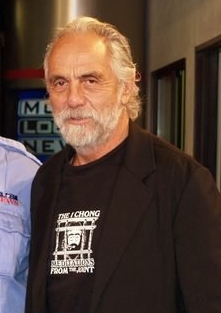Author: Justin Mckibben
Stereotype exists. I KNOW RIGHT… how crazy is that? Well sad as it is, it is true. Stigma has clouded our perceptions with various assumptions of what a “typical” (fill-in-the-blank) really looks like, acts like, dresses like and what it all implies about them as a person. Life is full of such diversity and indescribable uniqueness, and yet we do everything in our power to dumb it down to terms we can understand, categorize, and chose to relate to or segregate from.
We apply prejudices without even realizing it sometimes, and when it comes to the infamous “pot-head” there is a laundry list of stereotypical behaviors. While it may seem far-fetched some of these are false, but people who use marijuana get a bad rep anyway. Well now some believe one of the “pot head” communities most famous reps might be giving them a bad name.
Wrong Mr. Chong
Tommy Chong, one half of the weed smoking duo Cheech and Chong along with Richard “Cheech” Marin that became sensations for their portrayals of hippie marijuana smoking buddies back in the 1970’s and 1980’s, may have bit the hand that has been feeding him his munchies all these years. Some speculate that Mr. Chong’s days as a credible marijuana activist have gone up in smoke. The National Cannabis Industry Association (NCIA) reportedly dismissed the actor from its Capital Hill petitioning. Why? Because he made a parody commercial that apparently endorses stoner stereotypes.
NCIA officials reportedly were up in arms over a recent farcical YouTube video that shows Mr. Chong smoking marijuana in a car, which in itself seems like a bad move since drugged driving is a consistent issue that the opposition uses as a road-block for advocates. So when he starts nodding off at the wheel in the video it only pours salt in the wound, and seems to endorse the worries of those who believe marijuana legalization is dangerous for that very reason.
But the NCIA worries don’t end there. Chong then tops of the stigma-fueled satire by using a “Tommy Chong Smokeswipe” which is a product he developed and markets that is designed to eliminate the odors caused by smoking, be it marijuana or tobacco. In the commercial Chong uses his “Smokeswipe” to get rid of the smell of weed on his clothes before meeting with a parole officer. Nice Mr. Chong, because the world needed another reason to believe all weed users are criminals on probation who can’t be trusted.
The jokes were all in good fun surely, but the NCIA understands that lawmakers in Washington probably wouldn’t be on board with Chong’s brand of humor. So regrettably the group decided that using him wasn’t the best approach in pushing for the changes in marijuana policy they’re seeking. Aaron Smith, the director of the NCIA wrote an email explaining the decision to Mr. Chong’s representatives stating,
“This sort of message is exactly the opposite of what we are trying to do with our efforts to legitimize the industry by showing it in a positive and responsible light. We are here to break ‘stoner’ stereotypes rather than reinforce them.”
In the past Mr. Chong’s status as a celebrity, pointedly one who got his fame from playing a burnt-out hippie who smoked marijuana like it was going extinct, concerned NCIA members who believed it would be a distraction from their message.
On the Other Hand
Now some people did get the joke, but it may not be enough support to justify the ad. Chong’s representatives attempted to downplay the snub in statements, saying the actor didn’t “want to cause, or be part of, any ripples in our allied goal.”
Some activists even jumped to Mr. Chong’s defense, and even apparently felt that he was treated disrespectfully. Pete O’Neil, who runs the C&C Cannabis Company in Seattle, said that when the actor was dropped from the cause he dropped his NCIA membership.
But despite being disavowed, the actor remains optimistic that marijuana legalization will soon be a reality across the country. While this prediction seems more tangible than ever, the last thing anyone needs in regards to drug use of any kind is more stigma. Stigma is probably the single greatest obstacle facing the drug addiction and recovery communities. Too many assumptions have been made, and sometimes addicts have willfully played into those prejudices.
How often do we see people who smoke marijuana making jokes about being lazy, or forgetful, or focused on hazy delusional thinking while scarfing down everything in sight. It has almost become a knee-jerk reaction for most people when they hear the term “addict” to envision a stereotype, and in your head you probably hear a “heeeeey maaaaan” just talking about Tommy Chong because you know, that’s how everyone who smokes weed talks.
Feeding into the stigma is one of the worst things we as addicts can do, whether in active addiction or in recovery from drugs and alcohol. Changing the stigma means changing our behaviors, and changing the way we view ourselves. Change isn’t always easy, but it is always possible. If you or someone you love is struggling with substance abuse or addiction, please call toll-free 1-800-951-6135
